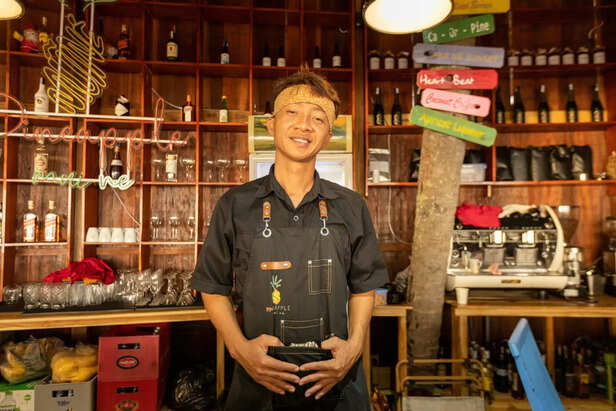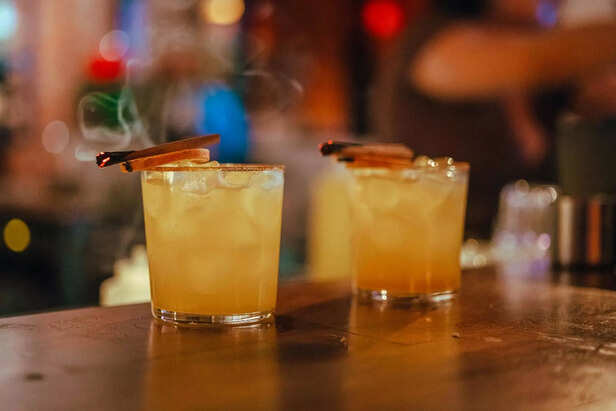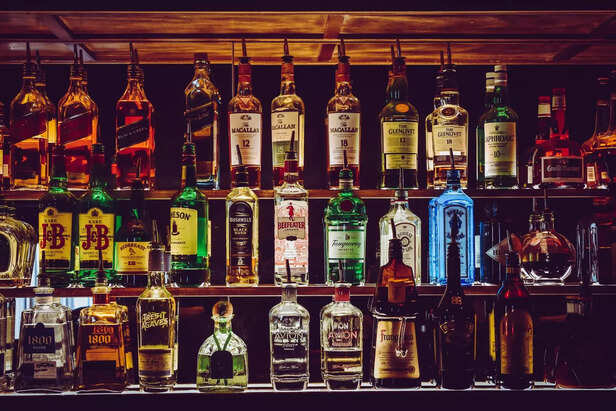Raise a Glass to India’s Liquor Legacy!
Ankita Rai | Sat, 12 Apr 2025
Toddy, a traditional Indian drink made from fermented palm or coconut sap, holds deep cultural significance, especially in southern states like Kerala and Tamil Nadu. Known for its mildly intoxicating taste and artisanal production, toddy is more than just a beverage—it’s a symbol of community, heritage, and everyday life. While legal in many regions, its production is regulated. The toddy culture reflects India’s rich legacy of indigenous brews and local drinking traditions.

( Image credit : Pexels )
Photo:
India, a land rich with diversity in culture, cuisine and custom, each imbued with their own set of traditions—many unknown to the casual onlooker. Among the lesser celebrated aspects of Indian culture are the fascinating and often overlooked indigenous alcoholic beverages crafted, refined and enjoyed for centuries. These libations, intrinsically tied to the regions from which they came, offer more than mere inebriation—they tell tales of local rituals, folkways and the heritage of India's vast communities. From the humble toddy of Kerala to the sweet and potent Mahua of central India, these Indian alcohol traditions deserve wider recognition. So join me on a journey through the country’s obscure spirit traditions, exploring the unique fermented that have been part of Indian life for generations.

Our first stop on this tour of India’s obscure spirit traditions is toddy, a drink particularly renowned in the southern state of Kerala. Toddy is a traditional alcoholic beverage made from the sap of palm trees, especially the coconut or date varieties. For centuries, toddy has been an integral facet of Kerala’s social and cultural fabric. Conventionally, toddy is harvested at dawn's first light by skilled tappers who skillfully scale the palm trees to gather the sap, which is then allowed to ferment creating a mildly alcoholic beverage. What sets toddy apart from other Indian alcoholic beverages is its distinct process and the fact that it's often consumed fresh, before it ferments fully into a stronger alcohol. This fresh toddy, also known as "kallu," has a sweet, slightly sour taste that makes it unique. Toddy plays an integral role in Kerala's culture, being paired with local cuisine at social gatherings and rituals.

While toddy may epitomize Kerala's drinking culture, diverse alcohol traditions across India also deserve recognition. In Goa, feni—crafted from cashew fruit—holds deep significance, with its sharp, fruity flavor and potency preferred for generations. Similarly, mahua, distilled from the sacred Mahua tree's blooms, is cherished in central India where it features in festivities and medicine. Northern India sees fermented grains play cultural roles. In Himachal Pradesh and Northeast India, rice beers like chhaang, home-brewed and passed down, foster close-knit communities. From feni to mahua to chhaang, India's regional spirits reflect varied agricultural, spiritual and social facets of diverse regions.

Kerala's toddy culture weaves itself into the very fabric of the state’s identity. Along Kerala's roads stand toddy shops, places that serve not just drink but as hubs where locals unwind, converse over a glass, and exchange stories. The profound link between toddy and Kerala's exuberant culture is indisputable. Moreover, Kerala's affection for toddy has prompted a rising focus on safeguarding traditional techniques and ensuring the palm-tapping, craft-brewing practice endures. However, challenges confront toddy's future. The ascent of mass-produced drinks and globalized habits have rendered toddy less popular among younger generations. But endeavors to maintain toddy culture and promote sustainability offer hope, gaining momentum as they preserve a window into Kerala's soul.

Among the most fascinating aspects of India’s local hooch are the deep-rooted roles they hold. Unlike industrial beverages consumed for fleeting pleasure, these drinks form threads in intricate weaves of ceremonies, festivals, commemorations, and gatherings that honor lineage, ritually mark life, and culturally cohere communities. Their production involves crafts handed down through eras, recipes and methods treasured and protected. Take, for instance, the rice wines found in Nagaland and Mizoram, where traditions run deep. These beverages are regularly consumed during sacred festivals, as their preparation has long been tied to the profound spiritual beliefs of local tribes. Similarly, in the forested regions of Madhya Pradesh and Chhattisgarh, Mahua features prominently in religious rites honoring ancestral spirits, representing a singular fusion of alcohol, culture, and worldviews.
Conclusion
India’s covert booze traditions weave a rich tapestry of tastes, lore, and cultural insights extending beyond superficial experiences. Whether it’s Kerala's toddy, Goa's feni, or the rice beers of the northeast, each drink stands for more than an alcoholic drink alone. It serves as a symbol of fellowship, ancestry, and a lifestyle preserved across ages. As the world grows ever more globalized, remembering and respecting these indigenous alcohol traditions is paramount. They are not merely artifacts of times past but living cultures continuing to shape modern Indian social fabric. So the next time you find yourself in Kerala, Goa, or elsewhere across India, take a moment to explore these hidden booze traditions—and perhaps even raise a glass to the heritages and cultures they represent.
Unlock insightful tips and inspiration on personal growth, productivity, and well-being. Stay motivated and updated with the latest at My Life XP.
Toddy in India : A Tradition With Roots Steeped in History

a man with local store
( Image credit : Pexels )
Our first stop on this tour of India’s obscure spirit traditions is toddy, a drink particularly renowned in the southern state of Kerala. Toddy is a traditional alcoholic beverage made from the sap of palm trees, especially the coconut or date varieties. For centuries, toddy has been an integral facet of Kerala’s social and cultural fabric. Conventionally, toddy is harvested at dawn's first light by skilled tappers who skillfully scale the palm trees to gather the sap, which is then allowed to ferment creating a mildly alcoholic beverage. What sets toddy apart from other Indian alcoholic beverages is its distinct process and the fact that it's often consumed fresh, before it ferments fully into a stronger alcohol. This fresh toddy, also known as "kallu," has a sweet, slightly sour taste that makes it unique. Toddy plays an integral role in Kerala's culture, being paired with local cuisine at social gatherings and rituals.
The Regional Diversity of India's Alcohol Traditions

local liquor
( Image credit : Pexels )
While toddy may epitomize Kerala's drinking culture, diverse alcohol traditions across India also deserve recognition. In Goa, feni—crafted from cashew fruit—holds deep significance, with its sharp, fruity flavor and potency preferred for generations. Similarly, mahua, distilled from the sacred Mahua tree's blooms, is cherished in central India where it features in festivities and medicine. Northern India sees fermented grains play cultural roles. In Himachal Pradesh and Northeast India, rice beers like chhaang, home-brewed and passed down, foster close-knit communities. From feni to mahua to chhaang, India's regional spirits reflect varied agricultural, spiritual and social facets of diverse regions.
Toddy: A Cultural Cornerstone of Kerala

liquor
( Image credit : Pexels )
Kerala's toddy culture weaves itself into the very fabric of the state’s identity. Along Kerala's roads stand toddy shops, places that serve not just drink but as hubs where locals unwind, converse over a glass, and exchange stories. The profound link between toddy and Kerala's exuberant culture is indisputable. Moreover, Kerala's affection for toddy has prompted a rising focus on safeguarding traditional techniques and ensuring the palm-tapping, craft-brewing practice endures. However, challenges confront toddy's future. The ascent of mass-produced drinks and globalized habits have rendered toddy less popular among younger generations. But endeavors to maintain toddy culture and promote sustainability offer hope, gaining momentum as they preserve a window into Kerala's soul.
India's Hidden Spirits and the Deep Significance of Indigenous Booze

liquor
( Image credit : Pexels )
Among the most fascinating aspects of India’s local hooch are the deep-rooted roles they hold. Unlike industrial beverages consumed for fleeting pleasure, these drinks form threads in intricate weaves of ceremonies, festivals, commemorations, and gatherings that honor lineage, ritually mark life, and culturally cohere communities. Their production involves crafts handed down through eras, recipes and methods treasured and protected. Take, for instance, the rice wines found in Nagaland and Mizoram, where traditions run deep. These beverages are regularly consumed during sacred festivals, as their preparation has long been tied to the profound spiritual beliefs of local tribes. Similarly, in the forested regions of Madhya Pradesh and Chhattisgarh, Mahua features prominently in religious rites honoring ancestral spirits, representing a singular fusion of alcohol, culture, and worldviews.
Conclusion
India’s covert booze traditions weave a rich tapestry of tastes, lore, and cultural insights extending beyond superficial experiences. Whether it’s Kerala's toddy, Goa's feni, or the rice beers of the northeast, each drink stands for more than an alcoholic drink alone. It serves as a symbol of fellowship, ancestry, and a lifestyle preserved across ages. As the world grows ever more globalized, remembering and respecting these indigenous alcohol traditions is paramount. They are not merely artifacts of times past but living cultures continuing to shape modern Indian social fabric. So the next time you find yourself in Kerala, Goa, or elsewhere across India, take a moment to explore these hidden booze traditions—and perhaps even raise a glass to the heritages and cultures they represent.
Unlock insightful tips and inspiration on personal growth, productivity, and well-being. Stay motivated and updated with the latest at My Life XP.
Frequently Asked Questions (FAQs)
- What is toddy drink in India?
Toddy is a traditional, mildly alcoholic beverage made from the fermented sap of coconut or palm trees, commonly consumed in southern India. - Is toddy illegal in India?
Toddy is legal in many Indian states, including Kerala and Tamil Nadu, but its sale and consumption are regulated and banned in some regions. - What is the toddy culture?
Toddy culture refers to the local tradition of tapping, brewing, and socially consuming toddy, often tied to regional identity, cuisine, and community gatherings.










